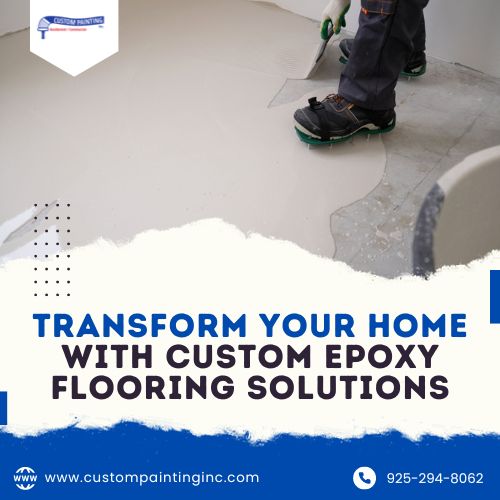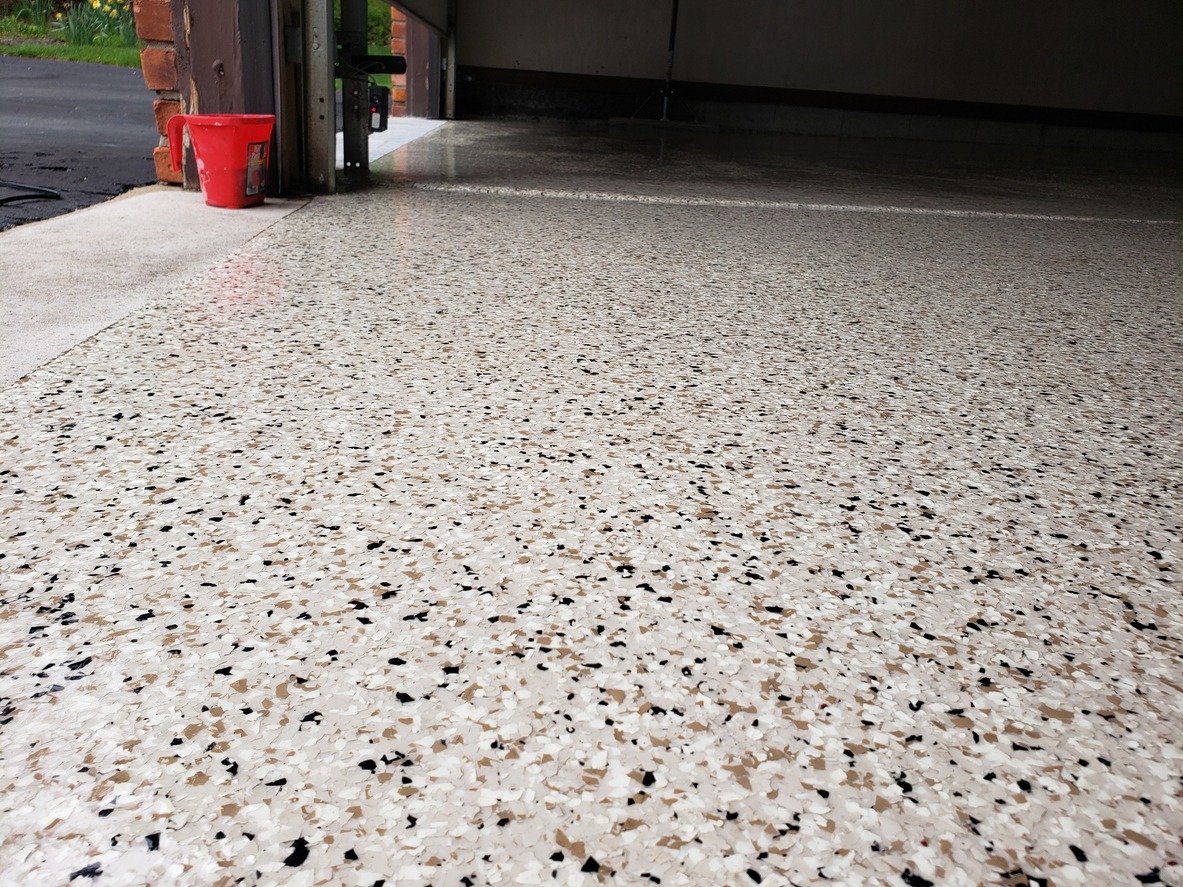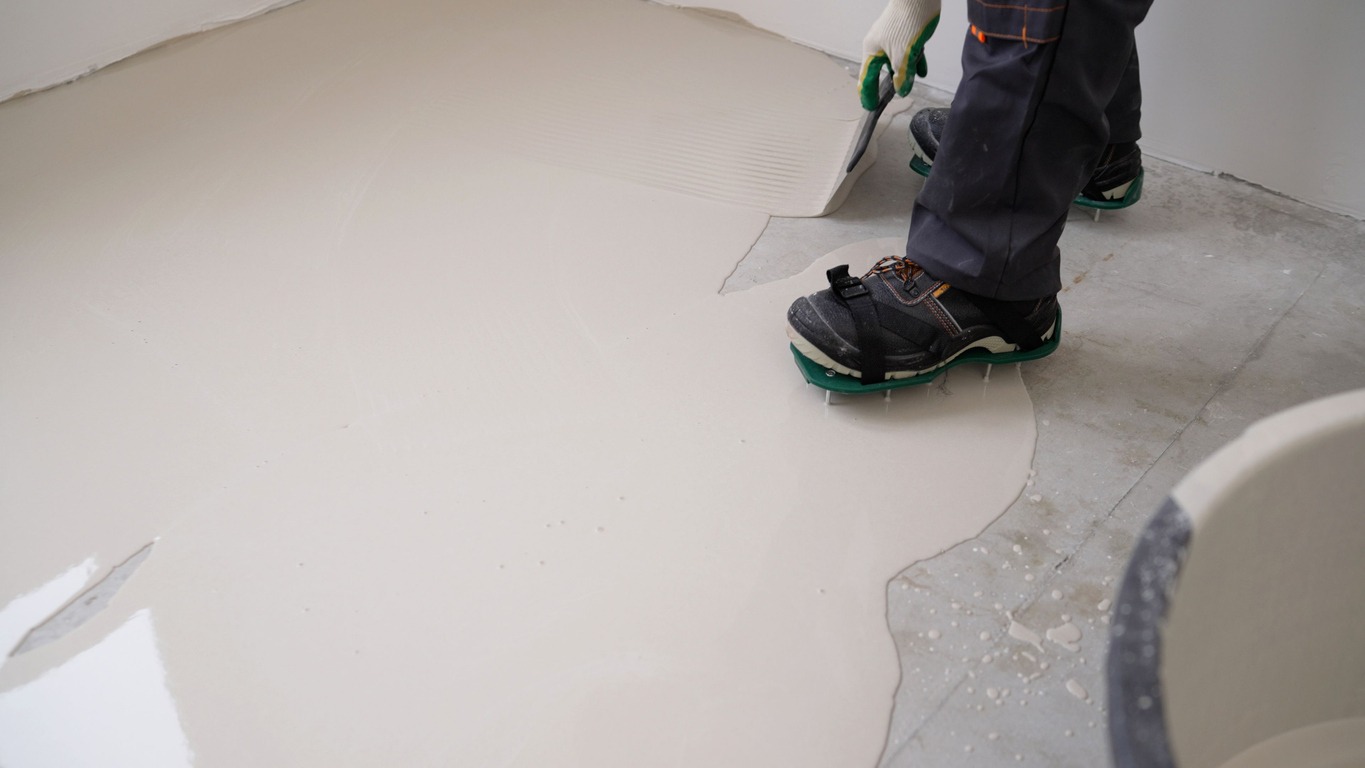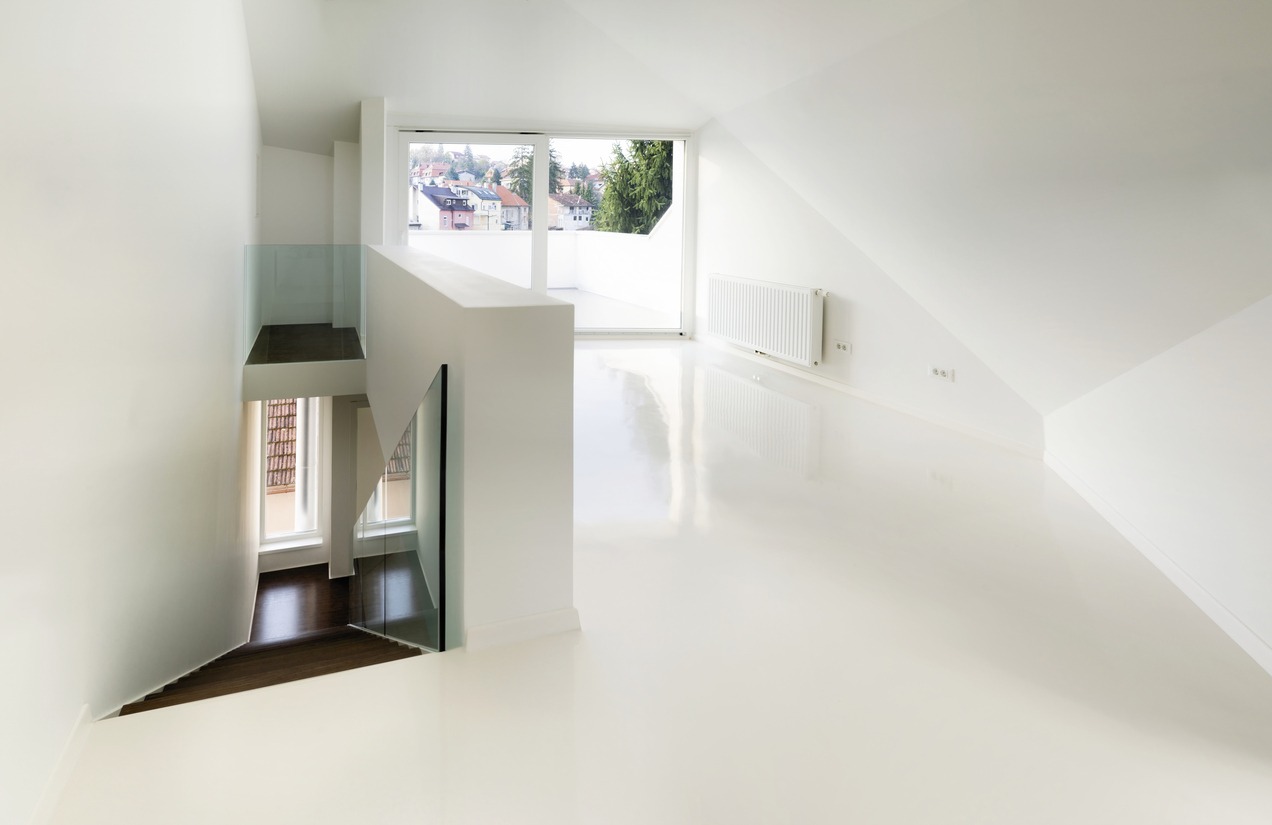Epoxy flooring is a popular choice in industrial and commercial spaces. This is due to its durability, ease of maintenance, and limitless aesthetic options. But custom epoxy flooring is also great for homes as it allows homeowners to transform their living spaces into personalized areas through vibrant colors and intricate patterns.
Let us discuss how epoxy flooring can revitalize your home. We’ll explore its benefits, the creative possibilities it presents, and tips for those considering this transformative solution.
Benefits of Epoxy Flooring
Below are some of the benefits that you can get from custom epoxy flooring:
- Exceptional Durability: Epoxy flooring is renowned for its excellent durability and longevity. It forms a hard, seamless surface that can withstand the demands of high-traffic areas. Epoxy resists scratches, impacts, and spills, making it an ideal choice for every room in the house.
- Low Maintenance Requirements: One of the most appealing aspects of epoxy flooring is its ease of maintenance. The seamless nature of the surface means there are no grout lines or crevices where dirt and debris can accumulate. This makes it incredibly easy to clean. A regular sweep and occasional mop with mild soap are all it takes to keep an epoxy floor looking pristine.
- Aesthetic Versatility: Epoxy flooring offers an unprecedented level of customization in terms of aesthetics. With a vast array of colors, patterns, and effects, homeowners can create a unique look that reflects their personal style. Whether you want a sleek, sophisticated grey floor or a vibrant, ocean-inspired design, epoxy can be tailored to meet your vision.
- Cost-Effectiveness: Its initial cost might be higher than that of some traditional materials, but its longevity and low maintenance needs make it a cost-effective option in the long run. Epoxy floors rarely need replacement or complicated repairs. This can save considerable money over time compared to carpets or hardwood floors that need regular refurbishing or replacement.
- Safety Features: Epoxy flooring can also enhance the safety of your home. It can be formulated with additives that provide anti-slip properties, making it safer underfoot in wet conditions. Its resistance to moisture and mold growth also contributes to a healthier living environment. This is particularly important in homes with allergy sufferers.
By incorporating these benefits, epoxy flooring enhances the functionality and style of a residence and contributes to a healthier and more durable living environment.
Design Possibilities with Epoxy
1. Unleashing Creativity with Custom Designs
Epoxy flooring is popular in home customization due to its flexibility in design. Homeowners can work closely with designers to create floors that reflect their personal tastes and styles. This could mean integrating specific color schemes that complement the furniture and decor or crafting unique patterns that make each room stand out. The ability to adjust and preview designs before application ensures that the final result is perfectly aligned with homeowner expectations.
2. Integrating Distinctive Features
Epoxy floors offer the unique advantage of incorporating various integrated features. Homeowners can choose to embed logos, which is particularly appealing for those wanting to showcase a brand or personal emblem within their space. Decorative chips or flakes can also be added to the epoxy to create depth and texture. Metallic effects can also mimic the look of marble or stained glass to add a luxurious feel to any room.
3. Exploring Color and Texture Options
The versatility of epoxy extends to its wide range of finishes. It enables complete control over both the look and feel of the floor. Colors can be as subdued or vibrant as desired, with many options available. Textural options are also plenty, with choices including smooth, matte finishes, and high gloss that enhances the brightness of a room. These options allow epoxy flooring to adapt to any interior design style, making it a suitable choice for every type of home.
Through these design possibilities, epoxy flooring offers a dynamic and innovative way for homeowners to enhance their living spaces.
Applications of Epoxy Flooring in the Home
Here are the parts of the home where epoxy flooring can be used and how it can enhance them:
- Living Rooms: Epoxy flooring can add a sleek, contemporary look to living spaces. Its reflective surface enhances natural light, making rooms appear larger and more welcoming.
- Kitchens: Due to its resistance to spills, stains, and high traffic, epoxy is ideal for kitchen flooring. It’s easy to clean and can be customized to match kitchen cabinets and countertops.
- Bathrooms: The water-resistant nature of epoxy makes it suitable for bathrooms. Anti-slip additives can be incorporated to enhance safety when the floor is wet.
- Garages: Epoxy flooring is extremely popular in garages due to its durability and resistance to oil stains, grease, and chemicals commonly found in this area of the home.
- Basements: Epoxy is a good choice for basements prone to dampness and mildew because it’s moisture resistant. It can also help brighten up these often dark spaces with reflective and vibrant finishes.
- Home Offices: You can Create a clean and professional environment in a home office with epoxy flooring. Its ability to reduce dust makes it ideal for keeping electronic equipment clean.
- Children’s Playrooms: Epoxy’s resilience makes it suitable for playrooms where the floor needs to withstand toys, spills, and frequent cleaning. Vibrant colors and designs can also make the area more engaging for children.
- Laundry Rooms: The spill-resistant and easy-to-clean properties of epoxy make it an excellent choice for laundry rooms where spills of detergents and water are common.
These diverse applications demonstrate the functional and aesthetic versatility of epoxy flooring in various areas of a home, catering to both practical needs and design preferences.
The Installation Process
Preparation Stage
The success of an epoxy flooring installation hinges largely on thorough surface preparation. This stage involves:
- Cleaning the Surface: The floor must be free of dust, dirt, oils, and any other contaminants. This often requires power washing, chemical cleaning, or both.
- Repairing Damage: Any cracks, chips, or other imperfections in the concrete need to be repaired before epoxy application to ensure a smooth finish.
- Leveling the Floor: It’s crucial to ensure the floor is level. High spots may be ground down, and low spots may be filled in to create a uniform surface.
- Acid Etching or Mechanical Profiling: This process provides a rough surface texture, which helps the epoxy adhere better to the concrete.
Application Techniques
The actual application of epoxy flooring follows a meticulous, step-by-step process:
- Primer Coat Application: The first step involves applying a primer, which penetrates and seals the substrate, providing a strong base for the epoxy.
- Mixing the Epoxy: Right before application, the epoxy resin is mixed with a hardener. The components must be mixed thoroughly to achieve the correct chemical reaction and ensure durability.
- Applying the Epoxy: Using rollers or squeegees, the mixed epoxy is applied over the primed floor. This step must be performed quickly and carefully, as epoxy can begin to set within a couple of hours.
- Decorative Elements: If additives like color flakes or metallic pigments are desired, they are sprinkled onto the wet epoxy before it sets.
- Top Coat Application: A top coat of clear epoxy or polyurethane protects the floor and enhances its appearance, providing additional durability and a glossy finish.
Curing Time
Epoxy flooring requires a curing period during which the chemical reaction between the resin and hardener occurs, resulting in a hard, durable finish:
- Initial Curing: This phase is crucial and typically takes about 12 to 24 hours. During this time, the surface should not be touched.
- Secondary Curing: The epoxy continues to harden and reaches its full strength within about seven days of application. It’s essential to avoid heavy traffic or placing furniture on the floor during this period.
- Factors Affecting Drying Time: Temperature and humidity play significant roles in the curing time. Higher temperatures and lower humidity levels can accelerate curing, whereas cooler temperatures and higher humidity can extend it.
Understanding these steps and considerations ensures that the installation of epoxy flooring goes smoothly and results in a durable, attractive surface that lasts for years.
Choosing the Right Epoxy Flooring Professional
Selecting a skilled and reliable epoxy flooring contractor is crucial to achieving a high-quality finish that meets your expectations and needs. Here are some key considerations to keep in mind during your selection process:
- Experience: Look for a contractor with extensive experience, specifically in epoxy flooring. This specialization is important as it requires precise skills and knowledge to ensure the flooring is applied correctly and lasts long.
- Portfolio: Ask potential contractors for a portfolio of their previous work. A diverse and extensive portfolio not only demonstrates their experience but also gives you insights into the quality and types of projects they have handled.
- Reviews and References: Check reviews on websites, forums, and social media. Speak directly to past clients, if possible, to get firsthand accounts of their experiences with the contractor. Positive feedback and high ratings are good indicators of reliability and quality of service.
- Licenses and Insurance: Ensure the contractor has all necessary licenses to operate in your area and insurance to cover any potential damages or accidents during the installation.
Consultation and Customization
- Initial Consultation: A reputable epoxy flooring professional should offer an initial consultation to discuss your specific needs and assess the project site. This is when to ask questions about their process, materials, and timelines.
- Tailored Solutions: During the consultation, the contractor should be able to advise on the best epoxy products and application techniques that suit your home’s specific conditions and your personal style. Whether it’s choosing the right color, pattern, or texture, a skilled contractor will guide you through the customization options available.
- Detailed Quotation: After the consultation, a professional contractor will provide a detailed quotation that outlines the scope of work, the materials to be used, the timeline for completion, and the total cost. This transparency helps avoid any surprises or hidden fees.
Choosing the right epoxy flooring professional is critical in ensuring your flooring project is successful and satisfying. By focusing on these criteria, you can select a contractor that provides a smooth and positive experience throughout the process.
Care and Maintenance of Epoxy Floors
Proper maintenance is crucial to ensure your epoxy flooring remains in excellent condition over the years. Here are some guidelines to help you keep your floors looking their best:
Routine Maintenance Tips
- Daily Cleaning: For everyday cleaning, use a dust mop or a soft-bristle broom to remove dust, dirt, and debris. This prevents the buildup of grit that can scratch the floor’s surface over time.
- Weekly Washing: Once a week, mop the floor with a mild soap and water solution. Use a foam mop or microfiber mop for best results, as they are gentle on the epoxy surface and effective at cleaning without leaving streaks.
- Avoid Harsh Chemicals: Harsh chemicals can degrade the epoxy coating. Always use cleaners specifically recommended for epoxy flooring or mild, pH-neutral detergents.
Dealing with Spills and Stains
- Immediate Action: Respond to spills quickly to prevent staining. Blot spills with a soft, absorbent cloth rather than wiping, which can spread the spill.
- Appropriate Cleaners: For tougher stains, use a cleaning solution appropriate for epoxy floors. Always test any cleaner on a small, inconspicuous area first to ensure it does not damage the finish.
- Avoid Scrubbing Pads: Avoid using abrasive pads or brushes, as they can scratch the floor. If scrubbing is necessary, use a soft scrub pad designed for delicate surfaces.
Long-Term Care
- Annual Checks: Inspect your floor annually for any signs of wear or damage, such as cracks or chips. Addressing these issues early can prevent further damage and extend the life of your flooring.
- Protective Measures: Use floor mats at entrances to minimize the amount of dirt and grit tracked onto the floor. Consider using protective pads under heavy furniture and appliances to distribute weight and prevent indentations.
- Professional Maintenance: Depending on the level of traffic and use, consider having a professional clean and apply a fresh, top coat every few years to renew the shine and protective layer, which can significantly prolong the life of your floor.
By adhering to these care and maintenance tips, your epoxy flooring will continue to look spectacular and perform well for many years, making it a smart and stylish choice for any home.
Conclusion
Epoxy flooring offers durability, aesthetic flexibility, and easy maintenance, making it an excellent choice for enhancing any home. Proper care and maintenance routines ensure your epoxy floor remains beautiful and functional for years. If you’re considering epoxy flooring for your home or need professional advice on maintenance, don’t hesitate to reach out to Custom Painting, Inc. Call us at 925-294-8062 or fill out our online contact form to get started on transforming your space with high-quality epoxy flooring solutions.




